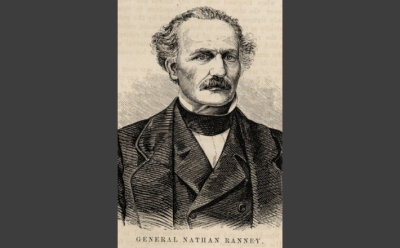
In 1825 Nathan Ranney sent a letter to his brother Nathaniel detailing what he had been up to in the past 10 years. The unique thing about this letter is that it was sent from "The Council Bluffs."
The letter begins with Nathan describing how he left home to enlist in the War of 1812. At the age of 16 he received permission from an uncle to join the ranks. He played a brave role in the Battle of Plattsburgh. After the war ended Nathan stayed on in the Army and joined an expedition to the Yellowstone. The troops went overland from New Brunswick, New Jersey to Pittsburgh. From there they took a steamboat on the Ohio and Mississippi Rivers to St. Louis. They left New Jersey March 1819 and arrived in Missouri in June of 1819.
Shortly after leaving St. Louis to make their way up the Missouri, Nathan left the army because he hadn't received an expected commission as an officer. Ranney continued up the Missouri on another steamboat and then switched to a keel boat once they arrived in Kansas City. On September 29th, 1819 he arrived at Fort Lisa, which was located in present day Florence, Nebraska. The winter was terrible at the fort. The weather was bitterly cold, plus many of the inhabitants were struck by scurvy. Nearly 200 people died of the affliction.
Nathan Ranney would travel several more times between the Council Bluffs and St. Louis. His main occupation was selling provisions to the troops. Many of the things he describes during his trips are still familiar today; sudden violent thunderstorms, blinding snowstorms and wonderful vistas from the top of the bluffs.
In October of 1822 Nathan went to New Orleans on business and to see the country. There was an epidemic of yellow fever in the city, so Nathan spent most of his time on the steamboat. Even so, a few days after leaving New Orleans he began to feel the symptoms of the fever. He took a powerful antidote. This made him feel better but then he came down with a severe earache, the medicine he took for this left him deaf for almost 2 months.
The letter ends with Ranney describing how he transferred goods from a boat frozen in the Missouri to Fort Atkinson.
Nathan Ranney settled down in St. Louis. In 1827 he married Amelia J. Shackford. They had 5 children.
Nathan spent the rest of his life in business in St. Louis. He was also and alderman, president of the school board and faithful member of the Presbyterian Church. In 1836 he was appointed a Brigadier-General in the Missouri Militia.
In 1876 Nathan suffered a stroke while visiting his daughter in Canada. He did not recover.
He died August 21, 1876 at the age of 79. Upon receiving the news all the river craft in St. Louis flew their flags at half-mast. Amelia died February 18, 1882 at the age of 71. They are both buried in Bellefontaine Cemetery in St. Louis.
Read the full transcript of Nathan Ranney's 1825 letter.
